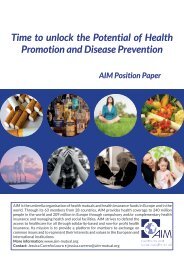Exploring patient participation in reducing health-care-related safety risks
Exploring patient participation in reducing health-care-related safety risks
Exploring patient participation in reducing health-care-related safety risks
Create successful ePaper yourself
Turn your PDF publications into a flip-book with our unique Google optimized e-Paper software.
Patient <strong>participation</strong> <strong>in</strong> elective surgery <strong>safety</strong> <strong>in</strong> Portugal<br />
that major progress <strong>in</strong> the use of <strong>in</strong>formation <strong>in</strong> the <strong>health</strong> system, <strong>in</strong> doctor–<strong>patient</strong><br />
relationships and <strong>in</strong> <strong>health</strong> <strong>care</strong> performance is <strong>related</strong> to the enormous amount of<br />
<strong>health</strong> and medical <strong>in</strong>formation available on the Internet (93), but the quality of<br />
such <strong>in</strong>formation is be<strong>in</strong>g discussed <strong>in</strong> different sett<strong>in</strong>gs and by different stakeholders<br />
(governments, policy-makers, HCWs and citizens). Specialist analysis of ICT was<br />
carried out by a group of national experts as part of preparations for the national <strong>health</strong><br />
plan 2011–2016, with the High Commissioner for Health publish<strong>in</strong>g f<strong>in</strong>d<strong>in</strong>gs <strong>in</strong><br />
September 2010. They reported that the topic was still be<strong>in</strong>g approached only cautiously<br />
and was sparsely documented <strong>in</strong> national studies and analyses (93).<br />
Increas<strong>in</strong>g use of ICT as a <strong>health</strong> <strong>in</strong>formation resource by Portuguese citizens and<br />
families seems, nevertheless, to be consistent with the <strong>in</strong>ternational picture (93). In the<br />
“Network society <strong>in</strong> 2006” <strong>in</strong>quiry, 19.6% of Internet users stated that they searched for<br />
onl<strong>in</strong>e <strong>health</strong> <strong>in</strong>formation. This represented a 3% <strong>in</strong>crease from the 15.9% recorded <strong>in</strong><br />
2003 (97). There seemed to be a correlation <strong>in</strong> the 2003 study with users’ age, literacy<br />
and gender, with <strong>in</strong>dividuals who looked most for <strong>health</strong> <strong>in</strong>formation be<strong>in</strong>g between 25<br />
and 44 years (97). A decrease <strong>in</strong> ICT skills was the reason for the rate decrease <strong>in</strong> older<br />
ages, but more women (22%) searched for <strong>health</strong> <strong>in</strong>formation than men (17.6%).<br />
In relation to the type of <strong>in</strong>formation researched on the Internet, 70.1% of respondents<br />
looked for <strong>in</strong>formation/advice about a <strong>health</strong> issue and 28.2% used the Internet as a<br />
complementary <strong>in</strong>formation platform follow<strong>in</strong>g a medical appo<strong>in</strong>tment. People searched<br />
ma<strong>in</strong>ly for <strong>in</strong>formation about diseases and treatments (11.4%), <strong>health</strong> <strong>in</strong>surance (8.3%),<br />
hospitals (8.2%) and the NHS (7.9%). They were mostly concerned about public <strong>health</strong><br />
issues: 16.2% looked for <strong>in</strong>formation about keep<strong>in</strong>g <strong>in</strong> good shape and exercis<strong>in</strong>g, and<br />
11.7% researched nutrition. A further 6.8% wanted to know about heart disease.<br />
In another study carried out <strong>in</strong> 2007, 49% of Portuguese citizens accessed the Internet,<br />
of whom 62% used it for <strong>health</strong> <strong>in</strong>formation research (30% of the total sample) (98).<br />
Media<br />
Television is still the preferred popular medium <strong>in</strong> Portugal, with coverage reach<strong>in</strong>g<br />
99.5% of the national population (99). In 2010, Portuguese people spent almost<br />
3.5 hours daily watch<strong>in</strong>g television (100), preferr<strong>in</strong>g news programmes (48.5%) and<br />
series (15.9%). Health <strong>in</strong>formation is mostly available through <strong>in</strong>formative and<br />
fiction programmes (soap operas and series). Health and social services topics<br />
correspond to 4% (<strong>in</strong> time) of the total national news coverage (99). Currently, the<br />
Portuguese public television provider (channel RTP1) provides a weekly debate<br />
programme entitled “Health Service” (101), which provides a platform for discussion<br />
and reflection that br<strong>in</strong>gs together <strong>health</strong> professionals, <strong>health</strong> <strong>care</strong> <strong>in</strong>stitutions, <strong>patient</strong>s<br />
and their families. The programme “Civil Society” (on RTP2) (102) is a network<br />
connect<strong>in</strong>g citizens with partners such as <strong>health</strong> professionals’ associations, universities<br />
and <strong>patient</strong>s’ associations.<br />
Recommendations<br />
Concern about <strong>patient</strong> <strong>safety</strong> <strong>in</strong> Portugal has become more apparent <strong>in</strong> recent years,<br />
br<strong>in</strong>g<strong>in</strong>g with it the opportunity to develop a national strategy for <strong>patient</strong> <strong>safety</strong> capable<br />
107



